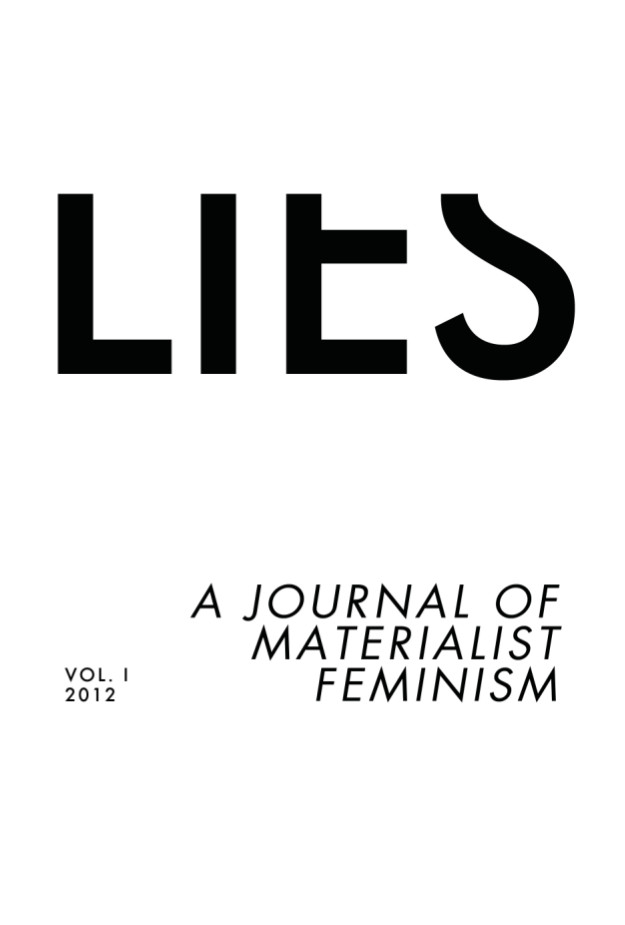Lies: A Journal of Materialist Feminism, No. 1 (2012)
Filed under journal | Tags: · communism, feminism, marxism, materialism, politics, queer theory, sex, theory, women

“LIES is a new journal spearheaded by a feminist collective based in Oakland, Baltimore, Los Angeles and New York City.
LIES is a communist journal against communists.
LIES is a platform for certain conversations and critiques that are difficult, impossible or dangerous if cis men are in the room.
LIES attacks the legacy of racism and transphobia that has plagued feminist organizing and strives to develop new ways of making autonomous feminist practices today that take pointed and militant attacks on white supremacy and transphobia as essential parts of feminist struggle.
LIES came out of our experience within struggles. It seeks to embody and develop in print the practice of autonomy that we needed to save ourselves in the midst of movements squared on patriarchy and fueled by the subordination of everyone but white cis men.
LIES draws its purpose and support from networks and circles of feminist, queer, and trans people, our friends and comrades to whom this journal is devoted.”
Creative Commons Attribution-Noncommercial License
250 pages
Jean-François Lyotard: Libidinal Economy (1974/1993)
Filed under book | Tags: · capitalism, desire, economics, philosophy, psychoanalysis, semiotics, sex

Libidinal Economy, a major work of modern Continental philosophy in its own right, is regarded as the most important response to Deleuze and Guattari’s groundbreaking work. Having broken from Marxism, Lyotard presents an almost nihilistic attack on the philosophies of desire in a polemical and compelling work.
This philosophical development of the Freudian concept of ‘libidinal economy’ is in part a response to Deleuze and Guattari’s Anti-Oedipus, it can also be seen as culminating a line of modern thought ranging from de Sade, Nietzsche and Bataille, to Deleuze, Klossowski, Irigaray and Cixous.
First published as Economie Libidinale, Les Editions De Minuit, Paris, 1974
Translated and with Introduction by Ian Hamilton Grant
Publisher Indiana University Press, 1993
ISBN 0253207282, 9780253207289
275 pages
Margaret Lock, Judith Farquhar (eds.): Beyond the Body Proper: Reading the Anthropology of Material Life (2007)
Filed under book | Tags: · biology, body, ethnography, everyday, gender, life, phenomenology, science, sex, social theory, women

“Over the past several decades, scholars in both the social sciences and humanities have moved beyond the idea that there is a “body proper”: a singular, discrete biological organism with an individual psyche. They have begun to perceive embodiment as dynamic rather than static, as experiences that vary over time and across the world as they are shaped by discourses, institutions, practices, technologies, and ideologies. What has emerged is a multiplicity of bodies, inviting a great many disciplinary points of view and modes of interpretation. The forty-seven readings presented in this volume range from classic works of social theory, history, and ethnography to more recent investigations into historical and contemporary modes of embodiment.
Beyond the Body Proper includes nine sections conceptually organized around themes such as everyday life, sex and gender, and science. Each section is preceded by interpretive commentary by the volume’s editors. Within the collection are articles and book excerpts focused on bodies using tools and participating in rituals, on bodies walking and eating, and on the female circumcision controversy, as well as pieces on medical classifications, spirit possession, the commodification of body parts, in vitro fertilization, and an artist/anatomist’s “plastination” of cadavers for display. Materialist, phenomenological, and feminist perspectives on embodiment appear along with writings on interpretations of pain and the changing meanings of sexual intercourse. Essays on these topics and many others challenge Eurocentric assumptions about the body as they speak to each other and to the most influential contemporary trends in the human sciences.”
With contributions by Henry Abelove, Walter Benjamin, Janice Boddy, John Boswell, Judith Butler, Caroline Walker Bynum, Stuart Cosgrove, Michel de Certeau, Gilles Deleuze, Alice Domurat Dreger, Barbara Duden, Friedrich Engels, E. E. Evans-Pritchard, Judith Farquhar, Marcel Granet, Felix Guattari, Ian Hacking, Robert Hertz, Patricia Leyland Kaufert, Arthur Kleinman, Shigehisa Kuriyama, Jean Langford, Bruno Latour, Margaret Lock, Emily Martin, Karl Marx, Marcel Mauss, Maurice Merleau-Ponty, Nancy K. Miller, Lisa Jean Moore, John D. O’Neil, Aihwa Ong, Mariella Pandolfi, Susan Pedersen, Gregory M. Pflugfelder, Rayna Rapp, Nancy Scheper-Hughes, Kristofer Schipper, Matthew Schmidt, Peter Stallybrass, Michael Taussig, Charis Thompson, E.P. Thompson, Anna Lowenhaupt Tsing, Victor Turner, Terence Turner, Jose van Dijck, Keith Wailoo, Brad Weiss, Allon White
Publisher Duke University Press, 2007
Body, Commodity, Text: Studies of Objectifying Practice series
ISBN 0822338459, 9780822338451
688 pages
PDF (119 MB, updated on 2019-8-16)
Comments (2)
